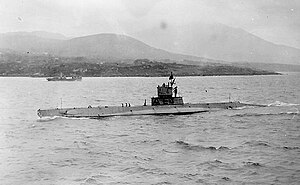USS L-4 (SS-43) was an L-class submarine of the United States Navy.
 L-4 underway off Berehaven, Ireland
| |
| History | |
|---|---|
| Name | USS L-4 |
| Builder | Fore River Shipbuilding Company, Quincy, Massachusetts |
| Laid down | 23 March 1914 |
| Launched | 3 April 1915 |
| Commissioned | 4 May 1916 |
| Decommissioned | 14 April 1922 |
| Fate | Sold for scrapping, 31 July 1922 |
| General characteristics | |
| Class and type | L-class submarine |
| Displacement |
|
| Length | 168 ft 6 in (51.36 m) |
| Beam | 17 ft 5 in (5.31 m) |
| Draft | 13 ft 7 in (4.14 m) |
| Installed power |
|
| Propulsion |
|
| Speed |
|
| Range |
|
| Test depth | 200 feet (61.0 m) |
| Complement | 28 officers and enlisted men |
| Armament |
|
Description
editThe L-class boats designed by Electric Boat (L-1 to L-4 and L-9 to L-11) were built to slightly different specifications from the other L boats, which were designed by Lake Torpedo Boat, and are sometimes considered a separate class. The Electric Boat submarines had a length of 168 feet 6 inches (51.4 m) overall, a beam of 17 feet 5 inches (5.3 m) and a mean draft of 13 feet 7 inches (4.1 m). They displaced 450 long tons (460 t) on the surface and 548 long tons (557 t) submerged. The L-class submarines had a crew of 28 officers and enlisted men. They had a diving depth of 200 feet (61.0 m).[1]
For surface running, the Electric Boat submarines were powered by two 450-brake-horsepower (336 kW) diesel engines, each driving one propeller shaft. When submerged each propeller was driven by a 170-horsepower (127 kW) electric motor. They could reach 14 knots (26 km/h; 16 mph) on the surface and 10.5 knots (19.4 km/h; 12.1 mph) underwater. On the surface, the boats had a range of 5,150 nautical miles (9,540 km; 5,930 mi) at 11 knots (20 km/h; 13 mph)[1] and 150 nmi (280 km; 170 mi) at 5 knots (9.3 km/h; 5.8 mph) submerged.[2]
The boats were armed with four 18-inch (450 mm) torpedo tubes in the bow. They carried four reloads, for a total of eight torpedoes. The Electric Boat submarines were initially not fitted with a deck gun; a single 3"/50 caliber gun on a disappearing mount was added during the war.[2]
Construction and career
editL-4's keel was laid down on 23 March 1914 by Fore River Shipbuilding Company in Quincy, Massachusetts. She was launched on 3 April 1915 sponsored by Mrs. Stephen A. Gardner, and commissioned on 4 May 1916 with Lieutenant (junior grade) Lewis Hancock, Jr., in command.
Service history
editAssigned to the Atlantic Submarine Flotilla, L-4 operated along the Atlantic coast, assisting in the development of new techniques in undersea warfare until April 1917.
Following the declaration of war on the Central Powers, the United States Navy dispatched submarines to European waters to protect the Allied shipping lanes. After a Philadelphia, Pennsylvania, overhaul, L-4 departed Newport, Rhode Island, on 4 December and steamed for the Azores. She departed Ponta Delgada on 19 January 1918, arriving for patrol operations at Berehaven, Ireland, on 27 January. While on patrol during April, L-4 twice encountered enemy U-boats in British waters and chased them from the paths of friendly convoys.
Based at Berehaven for the rest of the war, U.S. submarines protected Allied shipping from U-boat attacks. Following the Armistice with Germany, L-4 departed the Isle of Portland, England, on 3 January 1919 for the United States, arriving Philadelphia on 1 February.
For the next two years, the submarine operated along the East Coast performing experiments developing the tactics of undersea warfare. L-4 decommissioned at Philadelphia on 14 April 1922 and was sold to Pottstown Steel Company in Douglassville, Pennsylvania, on 31 July 1922 for scrapping.
Notes
editReferences
edit- Friedman, Norman (1995). U.S. Submarines Through 1945: An Illustrated Design History. Annapolis, Maryland: Naval Institute Press. ISBN 1-55750-263-3.
- Gardiner, Robert & Gray, Randal, eds. (1985). Conway's All the World's Fighting Ships 1906–1921. Annapolis, Maryland: Naval Institute Press. ISBN 0-85177-245-5.
- This article incorporates text from the public domain Dictionary of American Naval Fighting Ships. The entry can be found here.
External links
edit- Photo gallery of USS L-4 at NavSource Naval History